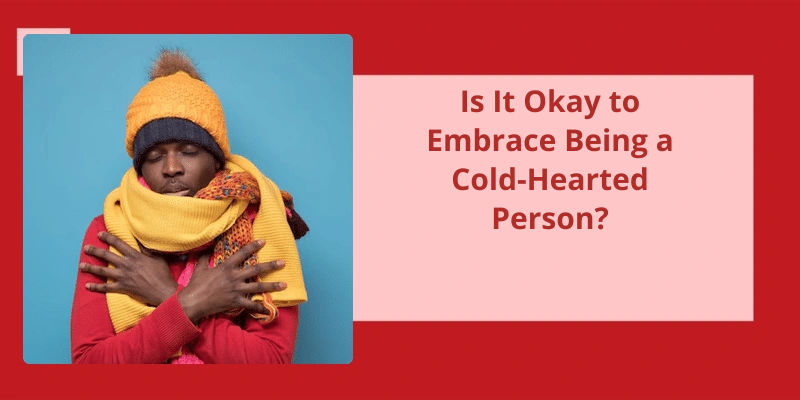As social creatures, we often associate warmth and affection with the traits of a good person. However, there may be situations where being cold-hearted or detached could be a more desirable trait. The definition of being cold-hearted may vary from person to person, but generally, it refers to the characteristic of being unemotional, unfeeling, and indifferent towards others. This presents the question, is it okay to be a cold-hearted person? The answer isn’t a straightforward one, as there are pros and cons to both sides of the equation. In this article, we will take a closer look at the arguments and factors that come into play when evaluating the cold-hearted approach towards life.
Is Being a Cold Person OK?
Cold-hearted individuals tend to make decisions based on logic and reason, rather than emotions. They’re often able to separate their feelings from their actions, allowing them to act objectively in situations where others may be too emotionally invested to do so. While this can sometimes be perceived as lacking empathy, it can also lead to more fair and rational decision making.
Another benefit of being cold is the ability to remain calm under pressure. Cold people tend to have a very high threshold for stress and are often able to stay level-headed in high-pressure situations. This can be a valuable trait in many different fields, from medicine to finance to law enforcement.
However, being cold can also have it’s drawbacks. It can make it difficult for cold people to form deep and meaningful relationships, as they may struggle to connect with others on an emotional level. They may also come across as distant and unapproachable, which can be off-putting to some people. Additionally, cold-hearted individuals may struggle with mental health issues such as anxiety and depression, as they may find it difficult to open up and seek help.
Furthermore, being cold can sometimes lead to selfish behavior. If one is too focused on their own needs and desires, they may neglect the needs of others. They may also struggle with compromise and cooperation, as their focus is primarily on their own goals and objectives.
However, it may take a bit more effort and self-awareness to do so. Ultimately, it’s up to the individual to decide whether being cold is ok for them, and to strive to be the best version of themselves they can be.
While we often refer to emotions using temperature-related terms like “warm” and “cold,” there’s a debate about whether being cold can actually be considered an emotion. This is because these terms are often used to describe the physical sensations associated with emotions, such as a warm feeling in your chest when you feel happy. Additionally, “cold” feelings don’t necessarily mean you feel physically cold, as anger can cause you to feel rather hot.
Is Being Cold an Emotion?
But can being cold be considered an emotion in and of itself? Emotions are typically defined as complex psychological states that involve the interaction between cognitive, physiological, and behavioral components. They’re usually characterized by subjective feelings, such as happiness, sadness, anger, fear, and disgust.
It’s something that we experience when our bodies are exposed to cold temperatures or when we lack warmth. Our bodies react to this sensation by constricting blood vessels, shivering, and increasing metabolic activity. These responses aren’t driven by emotional processes, but rather by physiological ones.
For example, if we’re feeling anxious or stressed, the sensation of coldness might be more intense or uncomfortable. Conversely, if we’re feeling happy and relaxed, we might not even notice the cold. In this way, our emotional states can color our experiences of physical sensations, including being cold.
In addition to it’s physiological effects, being cold can also have social and cultural connotations. For example, in some cultures, being cold might be seen as a weakness or a lack of physical resilience. In others, it might be seen as a sign of toughness or fortitude. These cultural associations can further shape our subjective experiences of being cold and influence how we interpret the sensation.
The Role of Temperature and Physical Sensations in Emotional Experiences
- Temperature can affect emotional experiences by altering the body’s physiological arousal levels.
- When people experience extreme temperatures, their emotional experiences can be heightened or diminished.
- Heat can increase aggression and arousal, leading to negative emotions like anger and frustration.
- Cold temperatures can induce feelings of sadness and isolation.
- Physical sensations like pain, touch, and movement can also influence an individual’s emotional experience.
- Massage and other soothing touch can reduce anxiety and promote positive emotional states.
- Conversely, pain and discomfort can intensify negative emotional experiences like sadness or anger.
- Understanding the role of temperature and physical sensations in emotional experiences can help individuals better regulate and manage their emotions.
Source: My warm and cold emotions – gentle teaching
Conclusion
While there may be some perceived advantages to being emotionally detached, the potential negative consequences to oneself and to others must also be considered. Ultimately, it’s up to each individual to determine their own values and priorities in life. However, it’s important to remember that treating others with kindness and empathy can have immeasurable benefits for both ourselves and those around us. Choosing to foster a warm and compassionate heart may not always be easy, but it’s well worth the effort in creating a more fulfilling and meaningful life.






